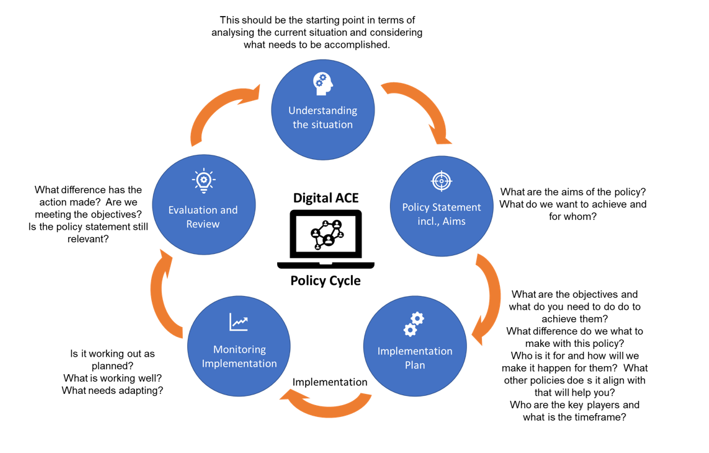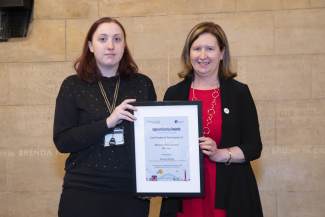Digital Policy

Digital Policy
1.Digital Policy
1.1 The purpose of this Policy is to provide clear guidance on the use of digital technologies within the delivery of our service and in particular our on-line learning model.
In September 2019, as Adult Community Learning providers were starting a new year of learning programmes, no-one knew the significant disruption that would hit these plans seven months later. Many providers, however, have now recognised the benefits of the forced move to online learning for some areas of their work and will now look to continue to provide online or blended curriculum models of learning moving forward.
This document will provide a framework for the safe and effective use of digital technologies within the service.
Policies are formal rules of an organisation that inform employees about decision-making. A policy will therefore highlight a providers’ rules for the safe and effective use of digital technologies throughout the organisation. It provides a basis for making the decisions about which actions you need to take. This is then realised through an action or implementation plan.

Our Vision
Whilst face to face teaching and learning is an important part of community learning, the effective use of digital technologies in facilitating learning has become much higher profile in recent months. It is our vision to enhance the learner experience where appropriate to do so, and where the use of digital technologies can bring real benefit to the learning and overall educational experiences of our learners.
Our Mission
To effectively use digital technologies where it is beneficial to do so to improve the educational experiences of all learners.
2. Equipment and platforms, including loan of equipment to staff and students
2.1 Newcastle City Learning regularly reviews the use of different equipment, platforms and software to ensure that it meets the needs of staff and learners, and it is cost effective. Newcastle City Learning will constantly review what equipment, platforms and software is used within the service to ensure that it genuinely enhances learning. Curriculum managers will regularly evaluate the impact of the use of technology within learning sessions to ensure that it is delivering good quality learning experiences which develop new knowledge, skills and behaviours, allowing learners to make good progress in their learning and towards their individual goals
2.2 The decision about which equipment, platforms and software to use will need to consider digital exclusion. Where learners do not have the equipment they need to access learning opportunities the service will endeavour to provide that equipment where it is practical and affordable to do so. In addition, training and support will be offered to all learners and staff, to ensure that they have the skills necessary to use any digital equipment, platforms and software effectively to support their learning.
Staff can attend face to face or on-line workshops to ensure that they are familiar with how to use all learning technologies effectively to deliver high quality learning sessions.
All new learners will receive training and support to ensure that they can use Google Classroom effectively to support their learning. Where learners are using alternative platforms, such as ZOOM, similar training and support will be provided by their tutors at the start of their learning programmes.
2.3 Safeguarding and PREVENT. The service has an obligation to ensure that learners are kept safe and aware of the risks to their safety throughout their learning programme. This is particularly relevant to the use of technologies which may raise the risk in terms of accessing inappropriate materials or threat of radicalisation. All staff and learners will receive appropriate training in reducing the risks associated with the greater use of digital technologies and in particular access to the internet.
Please see Staying safe online (appendix 1 – digital policy).
2.4 Loans of equipment to staff and learners. Both staff and learners may loan equipment to support teaching, learning and assessment. Strict conditions related to the lease of such equipment will be in place and staff and learners will need to sign and agree to certain conditions in relation to the safe use of that equipment, and the return of such equipment.
Please see Agreement for the loan of ICT equipment for learners and staff (appendix 2 – digital policy).
2.5 All partners or contractors will be required to read and abide by the Newcastle City Learning policy for the use of digital technologies.
2.6 Bring your own device (BYOD). Staff and learners may want to use their own equipment to support their work and learning. Many learners now routinely use their mobile phones for example to support their learning. Newcastle City Learning is happy for learners to use their own equipment as long as they abide by the conditions of our BYOD policy and protocols.
Please see Bring Your Own Device policy (appendix 3 – digital policy).
3.The digital curriculum
3.1 In many areas of our curriculum provision we will be using an online or a blended model of learning. Online learning and blended models of delivery may be used moving forward when seen as an appropriate alternative to face to face delivery.
However, both models should include all similar elements of face to face curriculum models.
Intent – the curriculum model should clearly identify what the intention of the learning programme is. What are the intended learning outcomes of the programme? What particular new knowledge, skills and behaviours are we looking to develop from the delivery of our intended curriculum?
Implementation – the curriculum model should clearly identify the range of learning activities and model to be used to reach the goals identified in the curriculum intent. How will new knowledge be presented? How will active learning be facilitated? How will progress in learning and current understanding be regularly checked? How will helpful feedback be provided to learners to help them improve their understanding or develop their skills? How will this then be implemented and checked? How will independent learning take place to extend learning beyond the online classroom?
The detail of the plan will be documented in a Scheme of Learning. The requirements of this plan are exactly the same for online, blended or face to face learning.
Impact – the impact of any curriculum should be evaluated in the same way, whether face to face, blended or online. What was the impact of the learning programme? Has it achieved its goals? What new knowledge have the learners gained, what new skills have they developed, what behaviours have they adopted which move them closer to their intended goal? Where have those learners progressed to?
The method of evaluating impact of learning will be collected through review of achievement data, learner feedback, review of development of wider skills, readiness for employment and destination data.
4.Learners and learning
4.1 All learners will be provided with training and support to be able to use the equipment, platforms and software used by the service as part of the curriculum delivery model.
4.2 All learners should be provided with training and support to ensure that they are able to remain safe in their learning.
4.3 All online learning materials developed by curriculum delivery staff employed by NCL for the purposes of delivery of the curriculum, will remain the property of Newcastle City Learning. This should be made very clear to staff when contracts are agreed for the delivery of learning. All curriculum staff should provide copies of learning materials developed which can be stored by their curriculum leads for the use of all other staff within the department. This will avoid duplication of work by different tutors across the service.
4.4 The quality of learning and learner progress will be evaluated from time to time by NCL managers responsible for the quality of the learner experience.
4.5 Learners who do not have access to the required equipment and software to progress with their learning will be able to apply to loan such equipment and software from the service. NCL will attempt to loan this equipment to avoid disadvantaging any learner, wherever it is practical and affordable to do so.
4.6 Learners will be required to respect the use of such equipment and return it back to NCL in the condition it was given.
4.7 It is imperative for the quality of learning for all, that learners follow the guidelines for effective online learning to ensure that we maintain a climate for learning which is respectful and conducive to learning at all times. All learners accessing learning online will be issued with a copy of our guidance for effective online learning to set out clearly the learner commitments for success and our commitment in respect of how this alternative learning model will be executed.
Please see Guidance for effective online learning (appendix 4 – digital technologies policy).
5. Quality assurance
5.1 The implementation of both online and blended models of delivery will be continuously monitored and evaluated to ensure that they remain fit for purpose and provide a high quality of education for all learners.
5.2 The content of online learning curriculum materials will be evaluated as well as facilitation of learning episodes to ensure high quality learning experiences are provided to all students. Materials used for online or blended learning are required to be of a high-standard, in line with those which would be used in a classroom.
5.3 All regulated and non-regulated provision will be internally moderated to ensure high quality of our provision is sustained whilst using digital technologies to deliver curriculum.
Please see our Moderation policy
6. Monitoring our Digital policy
6.1 It will be essential to monitor the effectiveness of our policy on a regular basis. As the development of new technology continues it is essential to ensure that we are continually using the most up to date technologies to best support our learners. A full review of the policy will therefore be undertaken every 12 months.
Relevant appendices
- Appendix 1 - Staying Safe Online
- Appendix 2 – Agreement for the Loan of ICT equipment for learners and staff
- Appendix 3 – Bring Your Own Device (BOYD) Policy
- Appendix 4 – Guidance for effective online learning – expectations and behaviours for effective learning online

